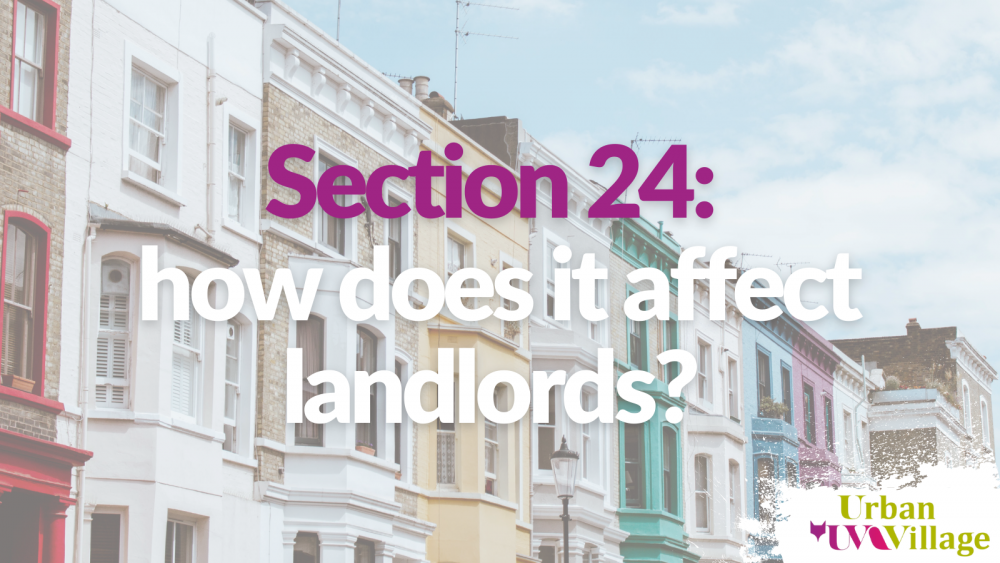- by Admin
- in News & Legislation
If you’re already a landlord or on the path to becoming one, you need to be aware of Section 24. The so-called ‘tenant tax’ is still relatively new on the scene, but depending on the tax bracket you fall into it could have a dramatic impact on your bottom line. Landlords take a massive hit to their profits, while tenants bear the brunt of a higher rent to offset tax hikes. Here’s our explainer on all things Section 24.
What is Section 24?
Announced in 2015, Section 24 was rolled in in phases, starting in April 2017 before coming into full force in April 2020. Before the new rules were introduced, you could deduct mortgage interest and any other costs related to your rental property (e.g. loans to pay for furniture, for example) from your income tax bill.
However, under Section 24 rules, UK landlords must pay income tax on all of their earnings from property – if you have any kind of loan or mortgage interest on the residential property you are renting out, you’ll pay more tax on those costs than you would have done before Section 24 was rolled out.
For basic rate taxpayers, this tax will equate to 20% of your rental income, while for higher rate taxpayers this is 40%. Mortgage interest is no longer deducted; instead, you can claim back 20% (the basic tax rate) of the mortgage interest from the tax paid.
What is the impact of Section 24 on landlords?
Section 24 was brought in to prevent high earners claiming back large amounts of tax and curb the private rental market – however in doing so it’s led to many landlords losing out on profit and in some cases even losing money.
Say for example you charge a monthly rent of £2,500 and have a mortgage of £2,000 – your profit totals £500. If you are a higher rate taxpayer paying 40% of £2,500, that’s £1,000 going to the taxman – a loss of £500 (before claiming anything back).
Quite simply, landlords with residential rental properties in the UK must fork out an extra wad of cash for letting out their property. But it’s important to remember that not all landlords are affected the same – commercial landlords who have created a limited company are exempt from Section 24, meaning they can accrue the profits without having to pay the tenant tax.
What about tenants?
According to Axe the Tenant Tax – a coalition of organisations representing more than 150,000 landlords – 9 out of 10 landlords are expecting to increase rents as a result of the tax, which obviously leaves tenants poorer.
There’s also a worry that Section 24 could actually worsen the housing crisis. Statistics show that demand is on the rise for rental properties – in 2018, 13 million people in the UK rented from a private landlord – but if the market is less attractive for landlords this could end up reducing the supply of existing and new housing stock.
How can landlords get around Section 24?
While it doesn’t look like the law will be changing any time soon, landlords can mitigate the impact in several ways, including the following.
Change your rental income
Since 2020, tax relief on mortgage interest has been replaced by a 20% tax credit, meaning basic-rate taxpayers aren’t nearly as badly impact. Savvy landlords can reduce their income below the higher-rate threshold, or increase their rent up to but not over the line - however, as mentioned this can lead to tenants losing out due to higher rents.
Become a limited company
As we mentioned, limited companies don’t have to pay tenant tax and they can offset mortgage payments or leave the profits to grow so they can buy the next property. However, it is important to note that by doing this they may have to pay stamp duty or capital gains tax, so it could be out of the frying pan and into the fire. Furthermore, if you purchase a property via a limited company, you are liable for corporation tax on your profits, this is currently 19%, but is set to rise to 25% by 2023.
Dividing up profits/assets with loved ones
If you split earnings or transfer your rental income payments to a lower-income partner/family member, this can mean you’ll only end up paying the basic tax rate and be able to claim back.
Seek advice
The impact that Section 24 can have on landlord finances is severe – that’ why it’s so important to have guidance and someone who knows the property market inside out on your side to give you the best possible advice.
Want to find out how you can curb losses due to tenant tax and maximise profit for your rental property? Urban Village’s team of professional, friendly property experts has you covered. Get in touch with us to discuss your requirements, call us on 020 3519 9121 or email info@urbanvillagehomes.
